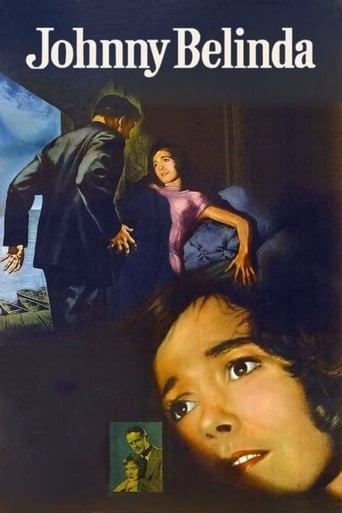evanston_dad
I was drawn to "Johnny Belinda" primarily to see how a film made in 1948 would tackle the subject matter of rape and unmarried pregnancy, and the answer was....pretty frankly.Jane Wyman won her Oscar for playing the deaf mute Belinda who pulls from resources of strength no one gives her credit for having when the small-minded town she lives in decides she isn't capable of taking care of her infant child, the product of a sexual assault perpetrated by one of the townsmen. The film isn't especially long, but it sure covers a lot of ground, starting with a kind doctor (Lew Ayres) opening up a new world to Belinda when he teaches her how to communicate through sign language and culminating in her trial for murder. Along the way, expert character actors like Charles Bickford and Agnes Moorehead deliver terrific performances, and Jan Sterling, one of my all-time favorites, shows that not all the townspeople are completely hard-hearted when she's faced with the prospect of separating a mother from her child."Johnny Belinda" cleaned up in terms of Oscar nominations in 1948, earning a whopping twelve. But Wyman's Best Actress win was the only award the film actually took home. It nabbed nominations for Best Picture, Best Director (Jean Negulesco), Best Actor (Ayres), Best Supporting Actor (Bickford), Best Supporting Actress (Moorehead), Best Screenplay, Best Art Direction (B&W), Best Cinematography (B&W), Best Film Editing, Best Dramatic/Comedy Score, and Best Sound Recording. Incidentally, it was only the second movie at the time (the first being "Mrs. Miniver") to be nominated for Best Picture, Director, all four acting awards, and writing."Johnny Belinda"'s condemnation of small-mindedness feels newly relevant in today's social and political climate. I'm not sure whether to be depressed by that knowledge (ugh, will nothing ever change?) or comforted by it (well at least generations of people before me have experienced the same thing).Grade: B+
dougdoepke
To me the Academy Awards are much more a matter of industry politics than real artistic achievement. Here, however, that's definitely not the case. Wyman's deaf mute is one of the more moving portrayals that I've seen in some 60-years of movie watching. She manages to express more with her eyes alone than most actresses do with their entire emoting. Thanks to Wyman, it's a rare glimpse into a delicate soul, though I do hope she wasn't being paid by line of dialog.In fact, the entire cast is outstanding, though visually McNally and Sterling approach caricature in his dark looks and her blonde cheapness. Of course, the topics of rape and a wedlock baby were pretty explosive stuff for the Production Code of the time, but the writers handle the material deftly. At the same time, the murder of MacDonald (Bickford) is often overlooked in terms of the Code. After all, the murder goes unrecognized in the courtroom accounting and in that sense goes unpunished even in an expanded moral sense.Something should also be said about director Negulesco's compelling visual compositions. Happily, so many of the interior frames are arranged richly in detail, while the moody landscapes reflect a perceptive artistic eye. All in all, we get both an atmospheric fishing village and a series of eye-catching visuals both of which expertly complement the storyline.No need to echo more aspects of this much-discussed film, except to say that Hollywood managed here to overcome one of the industry's biggest pitfalls—a kind of soap opera that's truly touching without being sappy. Thank you, Warner Bros.!
T Y
This movie stands out as being more beautifully photographed than typical dramas of the time. Granted, its 'Noir' peers are nothing to sniff at, but this is more directly filmed, only occasionally breaking into the Noir dynamic range, with dark blacks and striking compositions. It's a regional Noir drama, reminiscent of Clash by Night. Unfortunately the photography is all that recommends this corny retread of The Scarlet Letter. The earnestness of every character is overbearing. The movie cheats all of its characters of depth with continual narrative cop-outs. At a potentially explosive scene, where Belinda might be harmed, the doctor arrives the very second he's needed to prevent the expected outburst, which should have been one of the movie's major dramatic moments. Gee, he sure is a swell guy! Belinda has only two modes, 1) pleasant/approval-seeking and 2) hurt. She's utterly neutral, a device to wring pity out of viewers and hang a sermon on. But pity isn't dramatically very interesting. And any unpleasantness or rage she's entitled to (and which would make her three dimensional) is erased from the script. All that's left to film is a mathematical balancing of moral points and a conventional romance. The actors are all over the map trying to suggest a Nova Scotian accent... Irish brogues, Canadian dipthongs, Scottish, Cockney, upper class British, American. What the hell... They should have tossed in Jamaican and pirate accents just for laughs.
kenjha
Wyman has the role of her career as a naive, deaf-mute young woman in a small Canadian town in the 19th century who is raped by a local hoodlum. She won an Oscar for her word-less performance, beating out Olivia De Havilland for "The Snake Pit." There are also fine performances from Ayers as a kindly doctor who takes interest in Wyman, Bickford as her tough father, and Moorehead as her aunt. The location cinematography is beautiful and it is sensitively directed by Negulesco. Other than a somewhat melodramatic courtroom scene, it is quite understated and surprisingly mature in handling a controversial subject, given the era in which it was made.




